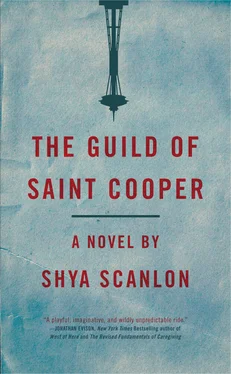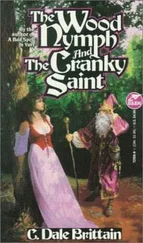Flick.
The top quarter of the screen was a rotating banner, a flashy number tempting the woman to download a video game prominently featuring swords.
The next one was from Anonimous. “Life is too short to be sensible.”
Anonimous?
The train shifted on the track and everyone swayed like anemones in a gentle undertow. I stood two stops later at Delancey, and the woman I’d been sitting beside glared up at me accusatorily. The features of her fat face seemed to have been pushed back into her head like the buttons in an overstuffed couch.
“They misspelled anonymous,” I said, and left the J train into the damp, heavy air one story below the street. People swarmed around me without touching, as though intuitively synchronized — something I had yet to master — and I stopped, started, making my way to the stairs in erratic bursts. At the top I took in the sharp smell of trash and called Mitch Earl, the only person I knew in New York. Mitch was a private investigator and knew everything.
“Blake,” he said, “make it quick.”
“Was there some ancient Greek person named Anonimous with an I? Like a king or something?”
“A king with one eye?”
“The letter I. In the name. A sage? There’s a quote I saw in this app, attributed to Anonimous with an I.”
“Hey!” he screamed into the phone. “Hey, get the fuck over here! Blake, buddy, sorry, I’ll call you back.”
Click.
Traffic streamed toward the Williamsburg Bridge, and I walked against it for a couple of blocks to my apartment — an armpit above the backside of a Chinese restaurant famous for its tacky décor and expensive private rooms. The basement kitchen doors yawned grotesquely at me as I passed, exposing enormous bowls of raw, glistening meat. I walked up four flights to my apartment, opened my door, opened my fridge, opened a beer, opened my laptop, and stood in my kitchen as night fell, staring at the glowing screen.
I was in a productive phase.
Honking brought me to the window around 11 p.m. On the street below, two yellow cabs were trying to angle through the same single-lane space between a group of people and a delivery truck. Men in white were bringing boxes from the truck down the steps into the sweaty crotch of my building, and the men in the cabs were leaning out their windows, yelling in a foreign language. It was a wonderful scene — the type of culture clash I’d moved to this city for, just the type of smashed plate I’d hoped would shake me, wake me from my post-collegiate slump. I climbed onto the fire escape.
The group had begun responding to the honking with shouts for the drivers to stop, to shut the fuck up, to fucking go fuck themselves, until one of the men, clearly drunk, stood before the cars and began to piss in the street. The two cabbies got out of their cabs and chased the still-pissing man around the stalled traffic, screaming that they were going to call the cops, until the man’s friends came to stand by him, arms crossed and cocky. The drivers shared a brief exchange and returned to their cars, then one by one backed down the street and drove off in different directions.
One of the men noticed me watching. He was wearing sunglasses and a yellow dress shirt with the collar popped.
“You get a good show?” he called up.
I waved.
“Fuck you!” he screamed.
I went back inside. I was in no condition to keep writing. I lay on the bed of my dark apartment, listening to Delancey, to the pulse, the ebb and flow of the city’s tidal traffic. That’s how it felt to me, like a tide. The city swelled with people a few times a day: in the morning, somewhere during midday, and then again in the evening. Different people, true, but they all worked in concert to create a feeling of high, rushing water moving through fixed architectures of iron and stone. My phone rang, and I let it. It would be my brother, my ex-girlfriend, or my mother. Were any of them worth getting up for? Maybe my brother. But he was least likely. It could also have been Mitch, I supposed. He’d invited me to a poker game that night, just around the corner, but I didn’t have the energy. He always invited me out, tried to drag me from my natural state of isolation to places I would never have otherwise seen — one night an old speakeasy, another an illegal boxing match. Almost every event was inconvenient, sketchy, and vaguely embarrassing, and his goal seemed to be simply to let me take it in, to share with me the thrill of access. It was a city built around the granting and refusing of access, and I kept reminding myself that the entire point of coming to New York had been exactly that, to see what I could get into.
I reached down and felt around for my clothes.
The crowd I’d seen outside was gone. The delivery truck was gone, too, leaving Orchard an empty vein. I walked north, across Delancey and into the center of the neighborhood. It had been my mother after all. Her message was brief but she sounded grim — she’d either spoken to my father or gotten back a bad test result. Either way, I didn’t want to hear it yet. I passed a bar Mitch called Motor Shitty, one of the first places he’d taken me. It was the kind of bar that gives mixed signals about how seriously it should be taken, and I thought Mitch enjoyed that ambiguity. He had a unique ability to sincerely shrug off the strange. I thought of the first time we met, how he’d simply shown up at my door, unannounced, with a six pack. He’d been asked by his father, who’d been asked by my father, to welcome me to the city. He’d explained this briefly, as though it happened all the time, and pushed past me to the kitchen.
“I haven’t spoken to my father in over a year,” I’d said. “I didn’t even know he knew I was here.”
I learned more over the course of the evening, slowly, as though Mitch were meting out a rare and precious resource that had to last us. Our fathers had met years ago in South America — my father working for a dubious plutocrat that Mitch’s father, a private investigator like Mitch, was there to tail. They’d become unlikely allies, then friends, though Mitch said they hadn’t seen each other in person since. This didn’t sound like friendship to me, though it did shed light on my father’s interpretation of distance. Perhaps it was because I felt so differently that I felt close to Mitch. He held some secret, I sensed, some connection to my father that I might never have.
On the corner of Ludlow and Rivington there were so many people in the street that a man riding a bicycle slowed to a stop and simply grabbed someone’s shoulder to keep from falling over. Two tall, glossy black women seemed to be having an argument, but as I got closer to them I realized they were just excited.
“He looked good,” one said, “but he didn’t look too good.”
“That’s why he looked so good!” said the other.
They stepped over a girl sitting with her back against a trashcan in a puddle of vomit. Beside her stood a man talking on the phone and shaking his head.
“This is totally different,” he said.
I went up Ludlow toward Houston.
I was very nearly finished being continually dumbstruck by New York, but I was nowhere near over the tempo, the pace that both accelerated my pulse and somehow enervated my spirit, turning me into a slack, buzzing thing. I texted Mitch to let him know I was near, and he said to tell the bartender I was there to see Goldie.
A bar back with the sentence “This is water” tattooed on his left forearm led me down a narrow staircase echoing with loud voices and laughter, and at the bottom we passed through an equally narrow hallway. It was hot and humid. Beer and booze boxes had been stacked against one wall, so we had to turn sideways to reach the door at the far side. The room was small with a low ceiling. Mitch sat with three other men around a mirrored table with empty beer bottles strewn underneath and a large pile of cocaine on top. They were playing Texas Hold ’Em but put down their cards as I came in. Mitch generally kept a conservative look appropriate for blending in anywhere, but the other men wore black jeans with crisply rolled cuffs and white t-shirts. Their faces were puffed up and splotchy, their eyes bloodshot. They’d been drinking hard and farting all night in this stuffy underground lair, and the smell was close, earthy and sweet.
Читать дальше












